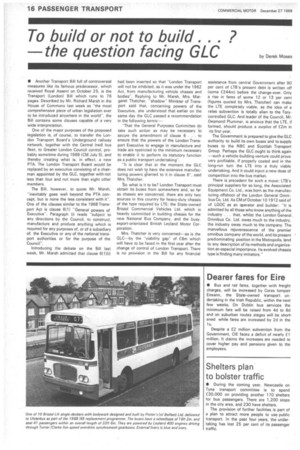To build or not to build . . . ?
Page 18

If you've noticed an error in this article please click here to report it so we can fix it.
the question facing GLC
by Derek Moses
• Another Transport Bill full of controversial measures like its famous predecessor, Which received Royal Assent on October 25, is the Transport (London) Bill which runs to 76 pages. Described by Mr. Richard Marsh in the House of Commons last week as -the most comprehensive piece of urban legislation ever to be introduced anywhere in the world", the Bill contains some clauses capable of a very wide interpretation.
One of the major purposes of the proposed legislation is, of course, to transfer the London Transport Board's Underground railway network, together with the Central (red) bus fleet, to Greater London Council control, probably sometime during 1969 (CM July 5), and thereby creating what is, in effect, a new PTA. The London Transport Board would be replaced by an executive consisting of a chairman appointed by the GLC, together with not less than four and not more than eight other members.
The Bill, however, to quote Mr. Marsh, "inevitably goes well beyond the PTA concept, but is none the less consistent with it". One of the clauses similar to the 1968 Transport Act is clause 6(1) "General powers of Executive". Paragraph (i) reads "subject to any directions by the Council, to construct, manufacture and produce anything which is required for any purposes of, or of a subsidiary of, the Executive or any of the national transport authorities or for the purpose of the Council".
Introducing the debate on the Bill last week, Mr. Marsh admitted that clause 6(1)(i)
had been inserted so that "London Transport will not be inhibited, as it was under the 1962 Act, from manufacturing vehicle chassis and bodies-. Replying to Mr. Marsh, Mrs. Margaret Thatcher, "shadow" Minister of Transport said that, concerning powers of the Executive, she understood that earlier on the same day the GLC passed a recommendation in the following terms:—
"That the General Purposes Committee do take such action as may be necessary to secure the amendment of clause 6 . . . to ensure that the powers of the London Transport Executive to engage in manufacture and trade are restricted to the minimum necessary to enable it to perform its statutory function as a public transport undertaking".
"It is clear that at the moment the GLC does not wish to have the extensive manufacturing powers g4ranted to it in clause 6", said Mrs. Thatcher.
So what is it to be? London Transport must obtain its buses from somewhere and, so far as chassis are concerned, there are only two sources in this country for heavy-duty chassis of the type required by LTE: the State-owned Bristol Commercial Vehicles Ltd. which is heavily committed in building chassis for the new National Bus Company, and the busy, export-orientated British Leyland Motor Corporation.
Mrs. Thatcher is very concemed—as is the GLC---by the "viability gap" of airn which will have to be faced in the first year after the change of control of London Transport. There is no provision in the Bill for any financial assistance from central Government after 90 per cent of LTB's present debt is written off (some £244m) before the change-over. Only a rise in fares of some 12 or 13 per cent (figures quoted by Mrs. Thatcher) can make the LTE completely viable, as the idea of a rates subvention is totally alien to the Torycontrolled GLC. And leader of the Council, Mr. Desmond Plummer, is anxious that the LTE, if formed, should produce a surplus of £2m in its first year.
The Government is prepared to give the GLC authority to build its own buses and to supply buses to the NBC and Scottish Transport Group. Perhaps the GLC ought to think again —such a vehicle-building venture could prove very profitable, if properly costed and in the long-run turn the LTE into a truly viable undertaking. And it could inject a new dose of competition into the bus market.
There is precedent for such a move: LTB's principal suppliers for so long, the Associated Equipment Co. Ltd., was born as the manufacturing offshoot of the London General Omnibus Co. Ltd. As CM of October 10 1912 said of of LGOC as an operator and builder: "It is admitted by all those who know anything of the industry . . . that, whilst the London General, Omnibus Co. Ltd. owes much to the industry, the industry owes much to the company. The marvellous rejuvenescence of the premier omnibus company of the world, and its present predominating position in the Metropolis, lend to any description of its methods and organization an especial importance. Its evolved chassis type is finding many imitators."












































































